State of The World
Planet Earth has all the means required to allow each of its 7 billion inhabitants to be provided with all the needs of an abundant life. But sadly, this is not what I see. Instead I see a planet on which a small powerful elite bask in fabulous wealth while the overwhelming majority live in unjustifiable poverty. Almost all are deprived of adequate food, clothing, shelter and, above all, space. All too many are also the frequent victims of war, violence and oppression.
Even in the wealthy West, practically all are dispossessed of land and a pleasant place in which to live and work. Their sad lot is to spend their lives in corporate slavery. They toil all day in their masters' offices and factories, returning each night to their bland suburban boxes to rest and ready themselves once more to serve their masters on the morrow. Yet an escalating minority is now denied even this unfulfilling existence. Unrequired by any master, and dispossessed of any wealth-producing means of their own, they are locked into a state of permanent poverty where they must endure the extreme isolation that poverty imposes.
The Dominant Elite
But who is this small powerful elite who bask in such fabulous wealth? They are an exclusive anthropological super-community of the rich and powerful. They are a favoured few who between them own and control all the land and resources of the Earth. Yet they came to possess all this not by merit; but by conquest, enclosure, clearance, inheritance, good fortune, serendipity and chance.
They are also an exclusive coterie of traders who between them control the so-called global 'free' market through which all goods and services are exchanged. Only they are able to buy and sell land — the only source of the needs of all human life. Only they can build economic enterprises large enough to survive and prosper within their global free market.
The generic name for the vast wealth they possess, in all its various forms, is
capital. And because it is through their capital that they are able to trade and prosper as they do, they themselves are commonly known as capitalists.
From where I stand within the socio-economic order, greed appears to be the force behind the capitalist's mentality. It is this alone that drives him along in his relentless quest to set up each increasingly ambitious enterprise. The sole purpose of every enterprise is to
maximise its proprietor's income. However, his enterprise has to be fed with raw materials and labour. This presents him with a cost, which consumes — and therefore deprives him of — some of the income that his enterprise generates. To maximise his profit he tries by all means to minimise costs, the most dominant of which is the cost of labour. His main problem is therefore to minimise the cost of labour.
His main instrument in this quest is technology. Advancing technology drives the rate of production per labourer up and up while at the same time reducing the skill level he needs to attain that higher rate of production. To the capitalist, therefore, technology is king.
Those They Dominate
In any capitalist society, capital inevitably becomes the possession of an ever smaller favoured few. Everybody else is, by definition, a labourer. A labourer is one who has been dispossessed of his fair share of the natural means through which he would be able independently to transform his labour into his needs of life. He can acquire his needs of life only by selling his own labour. He therefore depends on being permitted (by one who does possess such means) to use them to transform his labour into the needs of human life in return for a wage with which he can buy his own needs of life. The labourer's share of the wealth, which the Earth yields in return for his labour, is his wage.
But the labourer's wage is the capitalist's labour cost. The capitalist's aim is to maximise his own profit by minimising his labour cost. His aim is therefore to minimise the labourer's wage.
The Cost of Labour
The dominant element in the cost of production is labour. People are expensive. The capitalist would be happy to do without them. But he can't. However, technology amplifies the output of the labourer. It also reduces the level of skill required of him, and hence the wage he can demand. The rate of production of a labourer is therefore a function of his level of skill, the number of hours per week he works, and the level of technology he is using to do his work.

By pushing up the level of technology, the capitalist can reduce the skill level required from his labourer and the hours per week he needs to work, while at the same time pushing up his rate of production.
This applies to all labourers, irrespective of their level of skill, knowledge and experience. It applies to the lower skilled first. But as technology advances, it begins to apply to labourers of greater skills and knowledge. Two centuries ago when machinery was introduced, low skilled labourers were reduced in stature. Now computers are replacing clerks, secretaries, accountants. Soon neural network software will render obsolete the skill of the typist and the skilled prototyper or tool maker. Expert systems will enable a low-skilled paramedic to replace the doctor and consultant in diagnosing and treating trauma victims. Absurd? Who in the 1960s would have lent any credence to the notion that, by the 1990s, computer programmers like me would have joined the ranks of the long-term unemployed?
As the level of skill required by a production task decreases, the size of the pool of available labour with that lower level of skill increases. This larger pool will include younger, and hence more naive labourers who are far less street-wise and hence cheaper and easier to control. Consequently, labour becomes more and more of a buyer's market.

Technology is always cheaper than labour. Machines do not need to be constantly fed and clothed. They do not have families to support. They can be switched off when not in use. The cost of advancing production technology is therefore always less than the cost it saves in reducing the skill level and working hours per week required to maintain a given rate of production. Nevertheless, human labour will always be required.
While advancing technology drives the rate of production per labourer ever upwards, his minimum cost stays static at what is called the
minimum sustainable wage.
The minimum wage is a natural quantum. It exists independently of political expedience. Nevertheless, its value is extremely fuzzy. This depends on the very subjective notion of what is acceptable. But acceptable to whom — they who decide it, or they who endure it?
A Natural Quantum: A labourer is human. He and his family must be kept alive. They have a finite minimum level of basic needs which must be supplied to keep them alive and sane. To buy these needs, the labourer must receive a definite minimum wage. His cost per hour or per piece cannot be less than that which, when multiplied by the maximum number of hours the labourer can work or by the number of pieces he can make per week, equals this minimum wage.

If his hourly or piece rate falls below this level, the number of hours per week he must work must go up. Else he and his family will starve.

The minimum wage is therefore a natural socio-economic quantum whose existence does not depend on whether or not it is recognised by the political régime which holds power within a given socio-economy at any given time.
Highly Subjective: This economic quantum is not a single, sharply defined amount of money which supports a single, sharply defined standard of living. Its level depends on exactly what is meant by the very subjective word 'need'. Being subjective, the word 'need' must be qualified in order to be meaningful. It demands that we ask the question 'need to live on in order to support what quality of life or level of well-being?' Being a minimum wage, it must be supposed that its size is the minimum necessary to achieve the minimum acceptable quality of life. So what is the minimum acceptable quality of life? On this matter, as far as I am able to see, officialdom is silent. I shall therefore suppose, reasonably I think, that it falls somewhere between the following limits.

But how much a labourer is actually paid is decided entirely by his employer (and the legislation of his capitalist employer's puppet government). The labourer himself has no say in the matter. His employer, whose mind is steered by the self-seeking tenets of capitalism, naturally pays the labourer as little as he can get away with. Recently and fortunately, the depth to which this can sink has been limited by a legal Minimum Wage.
Acceptable to Whom?: I am led to believe that the Minimum Wage is set by a team of government economists. They try to think of all the things a low paid labourer 'needs' to live on to give him what they see as an acceptable quality of life. But highly-paid government economists have no personal experience of long-term existence on a low wage. They have no mental frame of reference against which to measure the fundamental needs of human life. In trying to do so, they are no more than blind speculators, amateur theorists. Their arithmetic cannot take account of what it is like to lack things that they themselves take for granted to the extent of never consciously having had to consider what it would be like to lack them.
Presumably, these economists start from nothing and proceed to make a list of all the things they think a low paid labourer 'needs', just as they do when working out what 'the law says' the unemployed 'need to live on'. If they happen to forget — or they neglect to consider — anything at all, the Minimum Wage is bound to be set lower than it should be. It could never be set higher. Consequently, what the labourer actually receives as the minimum sustainable wage is unlikely to be anything like the amount necessary to support the quality of life the economists had in mind for him. It can only ever be less.
Subsidising The Rich: A minimum wage is paid to an individual. He receives the same amount irrespective of the number of dependants he has. At the time of writing, the Minimum Wage is £3.60 an hour. This is £135 for a normal 37½ hour week. Despite my high-demand leading-edge skills in information technology, having been unemployed for 10 years, I could never hope to 'earn' more than the Minimum Wage.
At the time of writing (June 1999), my State welfare is £157.25 per week for me, my wife who can't work and our two teenage sons who are both still at school.

I thus get 16½% more on state welfare than I would by working a full week. If I still had a mortgage, this percentage difference would be even greater.
It is my State welfare level which is the amount 'the law says I need to live on', not the Minimum Wage. Consequently, if I were working, the DSS would have to 'top up' my minimum wage by an extra 16½%. This 16½% is ultimately provided by the generic taxpayer. It is not difficult to see that consequently, the generic taxpayer is subsidising the wage bill of my employer, and thus, in effect providing him with an element of profit which is not being 'earned' by his enterprise. The capitalist's business is being propped up by the taxpayer. Thus it is really the capitalist — not the subsidised labourer — who is free-loading on society.
The real effect of advancing technology is therefore to drive down the number of labourers an enterprise needs in order to maintain a given rate of production.

As technology advances, the capitalist therefore jettisons more and more labourers from his workforce. He is unconcerned with their fate. After all, it is not his problem, and neither capitalist law nor capitalist morality places upon him any obligation regarding their fate or their circumstances.
Under capitalism, as herein described, life for the labourer is hard and can only get harder. Nevertheless, in the indoctrinated public mind at least, it has an air of long term stability. The demand for the higher skills falls gradually. The labourer's wage sinks smoothly down to the minimum level of welfare. A growing proportion of the population is progressively jettisoned from the active work force. The future is thus predictable. It can be planned for. Observed reality, however, is different. What we see is late twentieth century capitalism driving the global economy relentlessly onwards along the road to chaos.
Parent Document |
© September 1995 Robert John Morton







